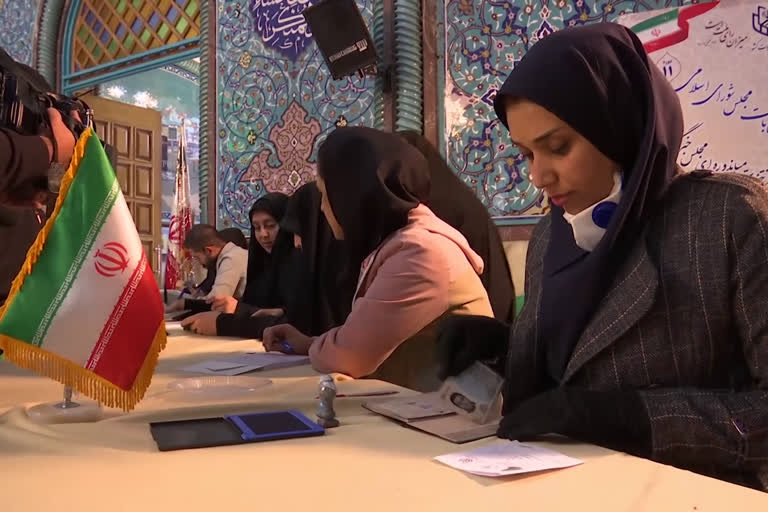Tehran: Iranians began voting on Friday in a parliamentary election which conservatives are expected to dominate, capitalising on public anger against moderate conservative President Hassan Rouhani over a ravaged economy, corruption and multiple crises.
State television showed the Islamic republic's supreme leader Ayatollah Ali Khamenei casting the first ballot in Tehran.
As he voted, Khamenei called on all Iranians to take part in the election as soon as possible, saying that doing so would guarantee the country's national interests.
The 11th parliamentary election since the 1979 Islamic Revolution comes after steeply escalating tensions between Iran and the United States and the accidental downing of a Ukrainian airliner that sparked anti-government protests.
Experts predict a low turnout with rising voter apathy that they say will serve the conservatives at the expense of Rouhani who was re-elected in 2017 promising more freedoms and the benefits of engagement with the West.
Iran has been hit by an economic slump and high inflation following harsh US sanctions after President Donald Trump pulled out of a landmark nuclear deal with Tehran in 2018.
"Iran's biggest problem is not having stability, peace and calm," said Amir Mohtasham who is 38 and jobless.
Read Also: Trump ally Roger Stone sentenced to over 3 years in prison
"Our elections are useless. Even the current parliament has 90 sitting MPs who are under investigation for financial corruption," he said.
Nearly 58 million people are eligible to vote.
Around half of the 16,033 hopefuls will contest the 290 seats up for grabs across 31 provinces after the Guardian Council barred thousands of would-be candidates, mostly moderates and reformists.
On Thursday, Washington slapped sanctions on five Iranian officials in charge of vetting candidates including Ahmad Jannati, a powerful cleric.
"The Trump administration will not tolerate the manipulation of elections to favour the regime's malign agenda," said treasury secretary Steven Mnuchin.
The Guardian Council slammed the sanctions saying they showed the United States' disdain for democracy.
"America's regime has shown through illegal sanctions... on members of the Guardian Council that it has nothing to do with democracy," said its spokesman Abbas Ali Kadkhodaee who was among those hit with sanctions.
"We are now even more determined to safeguard the people's vote," he tweeted.
On the eve of the elections, state media aired a short clip showing votes transforming into torpedoes hitting enemy navy ships closing in on Iran.
Hessameddin Ashena, Rouhani's main adviser, warned on Twitter that abstention increases the possibility of military aggression.
Turnout in Iran's past 10 elections averaged 60.5 percent, according to the interior ministry.
The Guardian Council said it expected at least 50 percent of registered voters to cast ballots.
Many voters, however, have voiced disinterest.
Read Also: Death toll in China's coronavirus jumps to 2,236; confirmed cases cross 75,400
"We voted for Rouhani with a dream and then we didn't achieve anything. So, in my opinion, people are not hopeful any more," said Mohammed who spoke from his carpet shop and only gave one name.
"I honestly don't want to vote, because it won't fix our problems and is of no use and this election is only a formality just so they can show to the world that they are chosen by the nation, while it is not so," said Pari Aghazadeh, a fashion designer.
In November, demonstrations over petrol price hikes spread across Iran and turned violent before being crushed in a deadly crackdown.
Tehran and Washington have nearly gone to war twice in the past seven months, most recently after the US assassinated prominent Iranian general Qasem Soleimani on January 3.
The martyrdom of the hugely popular general provoked an outpouring of grief in Iran.
Millions of people turned out to mourn his death, but that unity suffered a blow after Iran finally admitted that it had shot down a Ukrainian airliner on January 8, killing 176 people.
The government sparked further anger by denying for several days that Iran was to blame, before owning up to a jittery reaction by a missile operator.
The disaster unfolded as Iran's defences were on high alert in case the US retaliated to Iranian strikes hours earlier on American troops stationed in Iraq in response to the killing of Soleimani.
Voting for the parliament, or Majles, lasts 10 hours but can be extended. Final results are not expected before Sunday.
Apart from the parliament, voters will also choose replacements for deceased members of the Assembly of Experts, 88-strong clerical body that appoints and monitors the supreme leader.
Read Also: FATF gives Pak time until Oct to exit grey list
(With Inputs from AFP)




